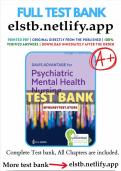Exam (elaborations)
Test bank for davis advantage for psychiatric mental health nursing 10th edition morgan full chapter
Course
Davis advantage for psychiatric mental health nurs
Institution
Davis Advantage For Psychiatric Mental Health Nurs
Test bank for davis advantage for psychiatric mental health nursing 10th edition morgan full chapter
Test bank for davis advantage for psychiatric mental health nursing 10th edition morgan full chapter
Test bank for davis advantage for psychiatric mental health nursing 10th edition morgan full ch...
[Show more]
Preview 4 out of 131 pages
Uploaded on
August 25, 2024
Number of pages
131
Written in
2024/2025
Type
Exam (elaborations)
Contains
Questions & answers
Institution
Davis advantage for psychiatric mental health nurs
Course
Davis advantage for psychiatric mental health nurs
$16.49
Also available in package deal from $40.49
100% satisfaction guarantee
Immediately available after payment
Both online and in PDF
No strings attached
Also available in package deal (2)
1. Exam (elaborations) - Test bank for essentials of psychiatric mental health nursing 8th edition morgan all ...
2. Exam (elaborations) - Halter: varcarolis’ foundations of psychiatric mental health nursing: a clinical ap...
3. Exam (elaborations) - Test bank for varcarolis essentials of psychiatric mental health nursing 5th edition ...
4. Exam (elaborations) - Test bank - davis advantage for townsend’s essentials of psychiatric mental health ...
5. Exam (elaborations) - Test bank for davis advantage for psychiatric mental health nursing 10th edition morg...
Show more
1. Exam (elaborations) - Fa davis maternity review questions test 1 questions and answers well illustrated.
2. Exam (elaborations) - Test bank for davis advantage for pathophysiology introductory concepts and clinical ...
3. Exam (elaborations) - Test bank for davis advantage for medical-surgical nursing: making connections to pra...
4. Exam (elaborations) - Test bank - davis advantage for townsend’s essentials of psychiatric mental health ...
5. Exam (elaborations) - Test bank for davis advantage for psychiatric mental health nursing 10th edition morg...
6. Exam (elaborations) - Test bank for davis advantage for pathophysiology: introductory concepts and clinical...
7. Exam (elaborations) - Test bank for davis advantage for pediatric nursing: critical components of nursing c...
Show more
,Townsend





